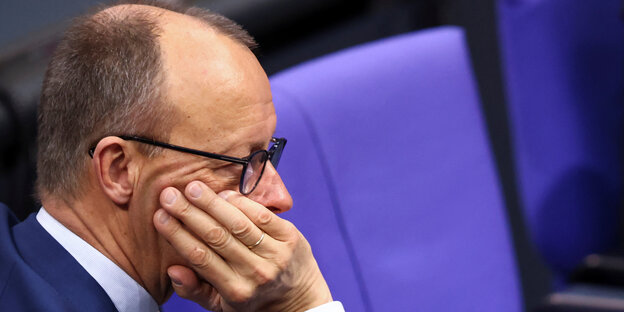How to confront the AfD? The CDU Presidium wants to debate this topic on Sunday evening. There are enough occasions.

Friedrich Merz thinks about it. Let's see what comes of this Photo: Liesa Johannssen/rtr
The CDU presidium meets regularly early on Sunday evenings, before the party committees officially meet in the morning. This often involves an exchange about the current political situation. Things will be different next Sunday. There is a specific and very fundamental question at hand: how to deal with the AfD, especially in the municipalities. And since the situation in the East German regional associations is particularly complicated, their presidents are also expected to attend the meeting.
There are enough reasons for such an exchange. Collaboration with the AfD occurs again and again in the municipalities, although it is actually excluded by a resolution of the party conference. Only recently did the AfD's motion to introduce a payment card for refugees prevail in the Dresden town hall, because CDU politicians voted in favor. Also in the Thuringian state parliament, the CDU has already relied on the AfD to help its proposals win a majority. The problem could worsen if the AfD continues to gain support in upcoming local and state elections.
So what exactly does this firewall mean? This will be discussed on Sunday evening. It seems unclear whether there will finally be a guide on how to deal with the AfD. Some members of the presidium commented positively on this to the taz. It is said that there is a need in the municipalities.
Regarding the content, many can support a document that the head of the regional council, Hans-Günter Hennecke, recently published in the newspaper FACE Has published. He claims that democratic elected officials in councils and district councils do not form factions or other groups with “members of anti-constitutional groups,” as Hennecke calls it. He should not file any joint application with them.
We are working on argumentative aids.
Nor should applications be approved that are in the interest of the municipalities. Democratic politicians should present their own proposals on time. Hennecke went on to say that democratic members should not elect enemies of the Constitution to office.
From the CDU headquarters it is known that no official guidelines are planned. That could put pressure on CDU leaders to act. If you write down in detail what is prohibited, the question quickly arises of what happens if violations occur. It has already been observed that some Christian Democrats do not respect what they are prescribed from Berlin. And party leader Friedrich Merz will not have forgotten how the Erfurt state parliamentary group allowed his predecessor Annegret Kramp-Karrenbauer to run, which was the beginning of the end of his party's presidency.
What they are working on, they say, is argumentative aids to deal with the AfD in the next elections. There will be many of these in the coming months. From the end of May to the beginning of June, local elections will be held in all eastern German states, there will be elections to the European Parliament and in the autumn the state parliaments of Thuringia, Saxony and Brandenburg will be re-elected. According to polls, the AfD could gain significant popularity at all levels.
